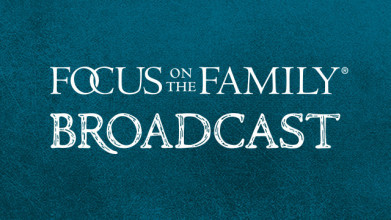
The War of Words
In this Adventures in Odyssey drama, a carelessly uttered word from Eugene creates havoc as it becomes the fashionable insult, resulting in a lesson about the power of words.
Home » Episodes » Focus on the Family Broadcast » Friendship or Flirtation? Danger Signs for Couples (Part 2 of 2)
John Fuller: Last time on Focus on the Family, Pastor Dave Carder shared the dangers of contacting an old flame.
Preview:
Dave Carder: If you are at a difficult spot in your marriage, and you are up at midnight trying to keep a baby happy, and you suddenly have the thought to contact Suzy or Bill, I wonder how they’re doing. To contact an old girlfriend or an old boyfriend at that stage of your life is like playing with dynamite. You don’t have to create infatuation with an old girlfriend or an old boyfriend, it’s already in your brain.
End of Preview
John: You’ll hear about ways to protect your marriage on today’s episode of Focus on the Family. Thanks for joining us. Your host is Focus President, Jim Daly. And I’m John Fuller.
Jim Daly: John, we’re talking about guarding your marriage by avoiding friendships that get a bit too close. And last time, our guest Dave Carder shared his experience of having two senior pastors abandon their families and their churches for an adulterous relationship. That’s what launched Dave on his 30-year quest to quantify the lure of infidelity and discover how to stop it before it gets started. Dave’s advice is coming from his experience counseling church people who were working through a first-time experience with infidelity, and that could be any one of us. Uh, just like those pastors that Dave worked for, they did not intend to lose their marriages and their ministries, but that’s what ultimately happened. And if you missed part one of Dave’s presentation yesterday, uh, please get in touch with us. Uh, we can send you the entire message on CD or audio download, or you can get the Focus on the Family app for your smartphone.
John: Just give us a call, our number is 800, the letter A, and the word FAMILY, 800-232-6459, or you’ll find, uh, those messages and more at focusonthefamily.com/broadcast.
Jim: And while this message is really, uh, for married couples, uh, single folks will benefit from it as well. They need to be aware of these warning signs so that they don’t get pulled into an inappropriate friendship with a married person.
John: I’d agree. Uh, so let’s just add that Dave Carder served as pastor of Counseling Ministries at First Evangelical Free Church in Fullerton, California for over 30 years. Dave is the author of several books, including, Anatomy of an Affair: How Affairs, Attractions, and Addictions Develop, and How to Guard Your Marriage Against Them. And we’ve got copies of that book here at the ministry. We’ll roll back just a bit as we begin so you can hear the start of Dave’s list of dangerous behaviors that could lead to an affair. And we’ll then post the entire list at focusonthefamily.com/broadcast. Here now is Dave Carder on Focus on the Family.
Dave: First of all, a close call friendship. When you begin to save topics of conversation for somebody other than your spouse because they understand you best or they understand you better, and you feel like you’ve got this connection between the two of you, when you look for and save topics, plan on topics of communication between you and your friend, that’s one of those stages or steps. Secondly, if you begin to share spousal difficulties under the guise of, you know, you’re a woman, help me understand how my wife works. Now, that’s very interesting, uh, topic. It’s really a form of criticism. You’re actually blaming your wife. You’re actually sharing confidential information with somebody who has no right to know it. It’s between you and your spouse, but we’ll do this. Now, I can’t tell you how many times I’ve heard this from people, uh, you know, I … she was sharing this story, or I shared some things, and the next one is the friend shares relationship difficulties. And now you’re off the, the business relationship or off the hobby or the interest or whatever else, and now you’re under really personal stuff. Four, when you begin to anticipate seeing this person more than going home and seeing your spouse, you are sliding sideways. People used to talk about, I’ve heard people say in sessions, you know, it’s just the anticipation of going to work and seeing them and and having conversation with them or having a cup of coffee with them, et cetera. You can do this, it’s just very easy. You know, we see our spouses at the two worst times of the day, in the morning when we’re trying to out the door, get the kids fed, get the books together, making sure everybody’s happy, got their lunch, the shoes they need for the, uh, baseball practices or the karate clothes. It’s terrible. Uh, we had four kids, I know, okay. And then in the evening you come back, and you start the same thing in reverse, and you go to bed exhausted. It’s very easy to begin to anticipate seeing somebody who’s fully dressed, clothed in the right mind, and who’s been thinking maybe even about you, okay. It’s just easy to do. When you begin to compare the spouse to this friend saying, oh, I wish she was more like that, oh, if he would just do that or he would talk to me like this other guy does, it’s easy. I just wanna keep saying, it’s easy. You begin to provide special treats for this friend. There is nothing wrong with this. I wanna say over and over, it’s how it all kind of collects and builds. But you provide special treats. You’re buying some mints at the store, and you think, you know, Bill really likes those, I’ll get him a box of them. You become more concerned about your friend than your spouse. And you say, oh, I don’t do that. Tell me, it is the easiest thing in the world to ask this friend, how you doing? Did you sleep okay last night? Now, when was the last time you ever asked your spouse that? Okay. Or you check in with him. Sometimes you’re just grateful that we made it through another day, or it is another month. You don’t really do this easily or often enough. You might even fantasize about marriage with this friend. Just fantasy, just thinking about it, not planning it or anything like that, but just fantasizing about him. I really do think, in my experience, that women do this more than men, but I could be wrong, okay. I could be wrong. I’ve been wrong about a lot of things, okay. Number nine, you begin to spend more alone time with the friend than with the spouse. And you say, no way. Oh yes, this happens easy. If you’re on a, a softball team, a coed volleyball team, if you’re on a, a worship team at some church and you’re singing at rehearsals, and i- if you’re in a mission feeding the poor, or if you’re on a hiking club, you can very easily spend more alone time with this friend than you do with your spouse. It’s unbelievably easy to do. If your spouse does not have access to all your conversations, and in this culture they don’t, email and texting and all kinds of ways you can relate to each other, the spouse doesn’t know wh- what’s … ha- half the things that’s going on that you’re communicating with. Let’s just read no spousal access, okay? Eleven, you spend money on this friend without the spouse’s awareness. You buy the treats, you maybe you do the lunch, you whatever. You’re just being nice, you’re just being friendly, but the spouse doesn’t know you’re spending money on this person. And it might not be a lot and it might not be regular, but it’s one of those things that I’ve heard through the years that has been part of this drift into emotional infidelity. You might even argue with your spouse over this relationship. Now we get really personal. He or she notices, you know, they’re hitting on you, or they seem to sure smile big when they see you, or whatever the case is, or her name sure comes up in a lot of your conversations. Uh, what’s going on here? And you begin to argue about it. You begin to be upset with each other over this. You’re gonna see a little later on, you might even accuse your spouse of jealousy. That’s a low blow. You might even lie to spend time with your friend. Now that’s just so easy to do, okay. You’re going to work for a special project, work starts said eight o’clock, you tell your wife, you know, I gotta be there at 7:30, prior to the meeting, or we’re staying afterwards to review how the, the dinner went that night that we put on together, the group of you. You begin to lie. You, you … Little white lies, you don’t have to be there till eight o’clock, but you’re going in at 7:30, you’re staying late, you’re going early. You’re doing things just to kind of spend more time with this friend. You hide interactions with the friend from the spouse. Now where I see this most often are people who go to church, and maybe they’re in a ministry together, maybe they teach somewhere together, maybe they have a, a clothing, uh, store for the poor, or shelters, or something like that. And you say to this friend, don’t smile at me next time you see me, my wife is watching. Or don’t say anything to me, just ignore me and overlook the fact that I might be somewhere close to you. And you begin to hide interactions with this friend from your spouse. And here comes the jealousy thing. Spouses just sense this. Now a lot of us guys are pretty naive and pretty dumb. My wife has said to me, you know, “She’s really paying attention to you.” And oh, no, you’re just making this. No, you need to pay attention to your spouse, they have radar out like this. You need to listen to that radar, okay. Don’t accuse them, they’re sensing something. Sixteen, you develop special rituals with this friend. A ritual is any regular experience highly anticipated by the two parties, if it didn’t happen, there’s lots of disappointment. That’s a ritual, has nothing to do with the calendar. So maybe you have coffee together, 10 o’clock, uh, at the company restaurant, or maybe you meet at the water fountain, or maybe you email each other a certain time every day, maybe you check in by text or something, or some other way you begin to build little rituals. Nothing wrong, evil, wicked, they’re just rituals.
John: You’re listening to Pastor Dave Carder today on Focus on the Family. And we have his book, Anatomy of an Affair, as well as a CD of this entire presentation. When you call 1 800, the letter A, and the word FAMILY, 800-232-6459, or donate and request those resources at focusonthefamily.com/broadcast. Let’s go ahead and return to more from Dave Carder.
Dave: The friend shares feelings or touches to which you inwardly respond, this is a trigger. If this friend lays a hand on your shoulder and you shiver inside, you’re at the top of the precipices and the only way is downhill. You are automatically re- … emotionally responding to what is an innocuous, maybe, touch or comment. Sexual content in conversations. You know, Friends and Seinfeld changed forever the way young adults talk. I have four adult children, 28 to 38, and they’re good kids, and all of them … uh, uh, my son is not married, but the three girls are, but they will talk about things I would never think of talking about with a member of the opposite sex. Anything goes. If you have young adults, 17 to 25 or 30, you understand exactly what I’m talking about. And it seems like a normal part of conversation. And last of all, this last one I call corporate dating. You participate in business travel, delicious meals you could never afford to buy with your wife, and she would never think of fixing for you. You go to entertainment venues that you would never afford if you were at home and have never done with your family, and then you return to the same hotel at night. You might have separate rooms, but I can’t tell you how many stories I’ve heard that it didn’t stay that way. That’s what I call a close call friendship. Now, there are people who build these kind of friendships intentionally, they like this kind of closeness, this kind of flirtation, or even this kind of teasing or they the tension between them and this other person. So the question comes about, well, how does this happen? What makes this or takes this over the edge? We’re gonna talk about that in just a second, but first we’re gonna take a visit of the dangerous partner profile. I’m gonna have to hurry here just a bit as we kind of skim through this. This is a work in progress. But when you’ve seen some of the people called girlfriends and boyfriends, you will understand why I would think there has to be more than just what meets the eye, okay. First of all, everybody has an internal age that’s different from their chronological development. The chronology just keeps right on moving, but internally you might yearn to go back when you were 15, or 17, or 25, or in college. We’ve all seen 50-year old’s try to dress like teenyboppers and have shirts unbuttoned to their belly button, and we’ve all seen five-year old’s run families. So everybody has an internal age, okay.
Audience: (laughing).
Dave: Sometimes there’s a developmental lag, especially if there’s been alcohol or drug abuse, other kinds of trauma in the family history like divorce, it can delay normal development processes. A personality style maybe that we admire, or look up to, or wish we had married or always kind of, uh, thought we would love to have close to us, but we didn’t choose a spouse like that, we didn’t have a partner like that. We have hobbies and interest that maybe our spouse doesn’t really have an interest in. If I had time, I could tell you a lot of stories about those kind of things. And we all have a different kind of attachment pattern. Maybe you like to be the one to give the chase or initiate, or as one guy says, I’ve taken care of so many people, I finally found somebody who would take care of me. So the attachment pattern that makes you particularly vulnerable. Maybe there’s a deficit in the family of origin, maybe you never had a dad in your home to mentor you or encourage you. Maybe your mom was a single mom and so busy, she didn’t have time to nurture, just getting the food on the table was all she could manage. And you’ve come into this marriage always hoping that maybe your spouse would make up some of those deficits. And you soon find out they can’t be your dad or mom and still be your spouse, it doesn’t work that way. Maybe there’s a marital void, a longstanding emptiness in the marriage that just makes you vulnerable to somebody who wants to provide it. And last of all, this whole pursuit pattern of being chased, being cared for, being sought out, et cetera, enters into this picture as well. Now you put together, these are bits and pieces, you put this together, take adolescent pieces that are undone, and you can put together a dangerous partner profile. You are especially susceptible to an individual with this kind of a template. I’ve come to believe that. I had a lady in our church, we have a large church, several thousand people, and I had a lady one time tell me, “I can look out over the audience, and I can tell exactly who is unhappy in their marriage.” I said, “You’re kidding.” She said, “No.” She said, “Ma- … Unhappily married people send out signals. And I’m looking for them because I hate rejection and I never wanna engage with somebody who’s gonna reject me.” Hope that doesn’t scare you too bad. The old flame, okay. The internet search is reunions, high school reunions. So many stories about college reunions, high school reunions, going back to those happy days. Remember the infatuation is already stored in your brain. This is the old flame. Now the question comes up, what makes this really dangerous? Here’s the trigger, I think up to this point most of the people who engage in what we’re talking about, to this point, are pretty innocent and they’re not intentionally trying to create a problem in their marriage. But there is a trigger, its sustained stress, two years of sustained stress. But you have to have a starting point to figure of this out. What is the starting point? Here’s the starting point, when you and your friend, or you and your classmate, or you meet somebody that just really triggers some interesting feelings in you, and you share with each other, I have feelings for you. You might never have touched each other, kissed each other, a- anything, but when you share mutual feelings of attraction with that person, from then on everything is supercharged. You are under the influence of a mood-altering substance. You see her at the water fountain, you hear her voice on the phone, you get a text message, your mood changes. And infatuation is the chemical that’s changing your mood. Now, what kind of sustained stress are we talking about? Unusual stress, such as legal issues, career threatening things, maybe your business has been bought out, maybe there’s some downsizing going on, maybe there’s severe financial crises, you’re on the verge of losing your home, maybe you’ve had some health issues, that diagnosis has suddenly cropped up on the horizon that you had no knowledge about, and relationship breakups, children that aren’t ac- … are acting out, maybe even other things with your grandchildren. These are the unusual stresses. So we take that time when you begin to share feelings with somebody else, you go back two years, and this is what I look for. This is the trigger, and it looks like this. Sustained stress makes you especially vulnerable to what has been a normal platonic friendship or makes you especially susceptible to a person who meets your dangerous partner profile, or makes you recall happier days when things were so innocent, when you knew Bill and Suzy, those times in your life when things just kind of worked well. You know, you never forget adolescent music, adolescent loves, adolescent sporting experiences, adolescent dances. You never forget those. You’re very impressionable in adolescence. And that is exactly what causes close calls that you begin to have to manage in a very special way. The language of attraction between you and this friend often becomes the language of seduction. I wanna read to you an email that I received. “I am really struggling with how this could happen to me when I sincerely didn’t want it to happen. When my partner first expressed her feelings to me, I tried to get her to join me in a discussion with our boss. She steadfastly refused; I only wish I had insisted. At the time I thought I could control the situation on my own. For months I counseled her about the emotional problems she was dealing with and kept telling her that an affair between us was not going to happen. Even when my resolve began to wane, I prayed with her. I prayed for God to take this temptation away from us. I prayed to God to bless and protect our spouses and her children. I prayed to God for guidance and direction to help us. “Of course, I knew what to do, get up and run away as fast as I could. Oh, how I wished I would have. Still, it troubles me greatly that this has happened and that I somehow allowed this to happen, that God let it happen when I prayed to him earnestly for help. Why, why did this have to happen to me? I’m a good person who has never done anything like this in my life. Was it an attack of the devil? Was it my own weakness?” I’m gonna tell you, you never ever want to feel the feelings that this man was going through, they are the world’s worst feelings.
John: What a sobering conclusion to the message today on Focus on the Family from Pastor Dave Carder, author of the book, Anatomy of an Affair.
Jim: That final story, uh, it just chills me to the bone, and it underscores the fact that we need to be vigilant in protecting our marriages. We need to put up a hedge so that we don’t end up like the man Dave was just talking about. And as we said at the start of the program last time, no one deliberately sets out to destroy their marriage, that’s insanity. But if we allow these intimate friendships to develop, uh, we’re playing with fire.
John: Yeah. And in today’s world, it’s not uncommon to spend more hours in the work environment than at home. And of course, attractions can develop between coworkers, uh, especially if we’re not actively nurturing our own marriage and, um, maybe haven’t established those boundaries that you’re talking about, Jim. That’s one-way affairs can start; I think. As Dave said, there’s the dangers of reconnecting with old flames and affairs can even begin in book clubs, and church groups, and, and so on.
Jim: That’s right, John. And speaking of boundaries, I’m reminded of an interview we did with Jerry Jenkins about his book, Hedges: Loving Your Marriage Enough to Protect It. Uh, he gave very concrete ideas on how to avoid a friendship that might go too far. Here’s a few. Try not to be alone with a member of the opposite sex. Invite a third person if you have to go to a business lunch, for example. If it’s impossible, at least tell your spouse about it so th- th- they’re aware and there’s that accountability.
John: Right. I think there is a kind of a policy of everything in the light. And while that can be inconvenient at times, uh, if you’re never alone with someone else, you’re never gonna have that conversation that gets, uh, too personal or maybe even downright flirtatious.
Jim: Well, and here’s another one, and I think a lot of people step over this boundary, don’t make personal compliments. There’s a, a big difference between saying, that’s a nice dress versus, uh, you look amazing. And I’ll tell you, John, I- I’ve just made it a habit not to comment on someone’s attire. Um, you know, it’s a discipline you can develop, I just don’t need to go there. And finally, Jerry Jenkins says, “Remember your wedding vows. Uh, look at them often and be deliberate about cherishing your spouse.”
John: Yeah, I, I think the bottom line is our, our marriages are worth protecting, even though that takes a lot of effort, just like the things, um, that we do to protect our health, we watch our diet, we exercise. A little bit of energy in those areas can go a long, long way.
Jim: That’s so true. Even just adopting this protective mindset about your marriage is so helpful. And you know that interview with Jerry Jenkins really had a lot of great ideas. So let’s make it available as a free download as well.
John: Great idea. And we’re gonna post that on the website, that’ll be at focusonthefamily.com/broadcast.
Jim: Well, I hope up it’s obvious that Focus on the Family believes in the importance of marriage, and we want to help you nurture and protect your relationship. Uh, our research shows that over 300 marriages a day are being saved by our collective efforts here at Focus. And I want you to be a part of these success stories when you donate to the ministry. Help us as we provide counseling consultations, resources, and our Hope Restored four-day intensives where couples can visit a retreat center and build up their relationship with the help of Christian counselors. Uh, one couple recently sent us this note, they said, “Our time at Hope Restored was the best investment we’ve ever made, and no dollar figure could match the value we received. The practical steps developed in the curriculum are brilliant, and the way you implemented them was genius. My wife and I witnessed a miracle last week, we are living a miracle happily married today.”
John: Mm-hmm. That is a terrific comment. And it is so encouraging to hear that kind of feedback, coming in from, uh, those couples who have said their intensive experience at Hope Restored was equivalent to a year’s worth of counseling.
Jim: That’s right, it’s a very effectual program. And here at Focus on the Family, we’re really stepping up our efforts to help save marriages, but we need you to partner with us financially. We are a nonprofit ministry, and we rely on your donations to get this work done. A gift of $30 allows you to play a role in healing a marriage. And when you make a generous donation of any amount, we’ll send you a copy of Dave Carder’s book, Anatomy of an Affair. So call us today.
John: And our number is 800, the letter A, and the word FAMILY, 800-232-6459, or you can donate online and request your book at focusonthefamily.com/broadcast. We’re gonna post two PDFs for you on our website, uh, Dave’s dangerous partner profile, as well as his list of 19 dangerous behaviors. Next time, Emerson Eggerichs suggests the power of moms offering respect to their sons.
Preview:
Dr. Emerson Eggerichs: We know in marriage, you know, the whole joke is women tend to be empathy oriented, but men are solution oriented. Men think in terms of solution, they try to help by solving it. Well, you can reverse that with your son and ask him, how is he gonna solve this problem? Appeal to him to solve the problem. You’re an honorable young man, this is unacceptable, I’m sure to you and to me, how can you solve this? Rather than telling him to solve it, ask him and watch what happens.
End of Preview

Dave Carder served as Pastor of Counseling Ministries at First Evangelical Free Church in Fullerton, California for 32 years. He holds graduate degrees in biblical literature and in marital and family therapy and is a clinical member of the California Association of Marriage and Family Therapists. Dave has authored several books including Anatomy of an Affair; Torn Asunder, and Unlocking Your Family Patterns. He and his wife, Ronnie, have four adult children and many grandchildren. Learn more about Dave by visiting his website: davecarder.com.

Receive Dave's book Anatomy of an Affair for your donation of any amount!

Best-selling author Jerry Jenkins explains how couples can guard against infidelity in a discussion based on his book Hedges: Loving Your Marriage Enough to Protect It.

Visit our online store and purchase a CD of today's program for yourself or to share with a friend.

For couples in crisis – you can still put the pieces of your marriage back together with Hope Restored.

Learn the hallmarks of a friendship that might become too close.

Pastor Dave Carder recommends taking note of the type of person to whom you are most attracted, so that you can be extra-careful in friendships with people who fit the profile.

You think it won't happen to you, can't happen to you. You think, There's no way. Not me! Think again.

The Focus Marriage Podcast features relatable advice on having a healthy marriage, with stories from guest speakers that challenge and encourage every couple to build a deeper connection.

After counseling people who have been hurt by infidelity, Dave Carder has learned that being aware and being prepared are more important than ever. There are too many opportunities for infidelity.

Am I justified in being upset about my wife's ongoing friendship with a former boyfriend? We've been married for three years, and they have maintained a close relationship the entire time.

Do you think it's okay for me to talk about problems in my marriage with a Facebook friend of the opposite sex? The spark has gone out of my relationship with my spouse, and we always seem to be facing some kind of challenge.

In this Adventures in Odyssey drama, a carelessly uttered word from Eugene creates havoc as it becomes the fashionable insult, resulting in a lesson about the power of words.

This discussion offers a preview of Volume #16 “Cultures in Conflict” from the That The World May Know video series, available below.

Debra Fileta will help couples better understand the four seasons of healthy relationships, what to expect during each one, and how to carefully navigate them for a stronger marriage. (Part 1 of 2)

Larnelle Harris shares stories about how God redeemed the dysfunctional past of his parents, the many African-American teachers who sacrificed their time and energy to give young men like himself a better future, and how his faithfulness to godly principles gave him greater opportunities and career success than anything else.

Amy Carroll shares how her perfectionism led to her being discontent in her marriage for over a decade, how she learned to find value in who Christ is, not in what she does, and practical ways everyone can accept the messiness of marriage and of life.

Jonathan McKee offers parents practical advice and encouragement in a discussion based on his book If I Had a Parenting Do Over: 7 Vital Changes I’d Make.